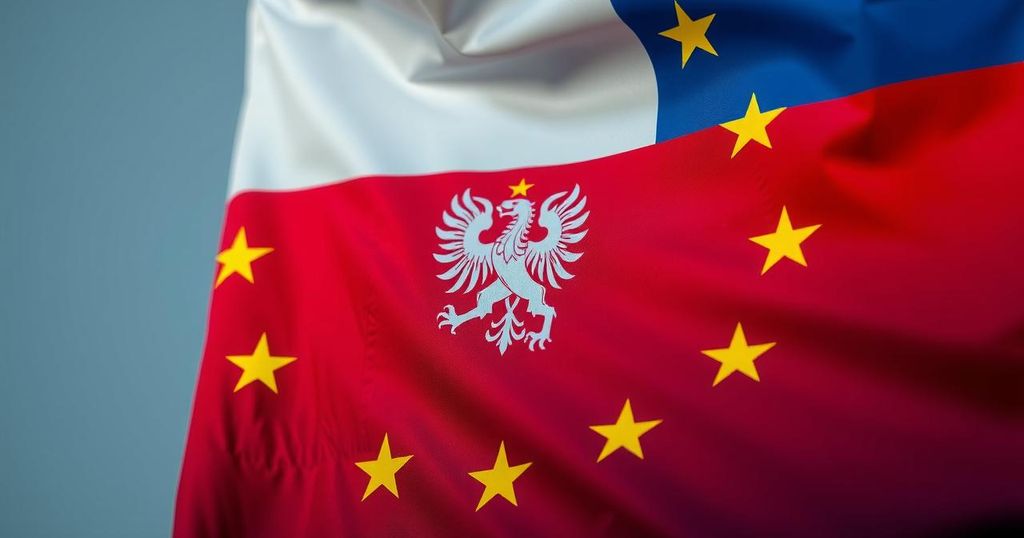Poland’s Critical Presidential Election and Its Impact on EU Leadership

Poland’s EU presidency coincides with its presidential election in May, placing Prime Minister Donald Tusk at a critical junction. Tusk aims to ensure a supportive successor to President Duda while managing domestic pressures and external challenges, especially concerning security in Ukraine. Despite reassurances from Polish officials that the election will not disrupt Poland’s EU leadership, Tusk faces pressures that could impact his presidency’s efficacy and agenda.
As Poland prepares for a pivotal presidential election and begins its six-month presidency of the European Union on January 1, Prime Minister Donald Tusk faces a critical juncture. His primary focus is on ensuring the election of a compatible successor to the current president, Andrzej Duda, who has consistently undermined Tusk’s government. Tusk’s Civic Coalition currently leads in the polls against the nationalist Law and Justice party (PiS), but this advantage is precarious, particularly with Duda’s support for the PiS candidates.
Tusk is under pressure to deliver on campaign promises concerning progressive issues such as abortion rights and civil partnerships, which complicate his governance during the presidency. However, Poland’s EU Affairs Minister, Adam Szłapka, maintained that the election will not hinder Poland’s effectiveness in Brussels. Nonetheless, Tusk’s administration must navigate domestic political pressures while addressing substantial external issues, including security concerns stemming from ongoing tensions in Ukraine due to Russia’s aggression.
In light of significant international developments, including the potential return of Donald Trump as U.S. president, Tusk is expected to prioritize Poland’s security agenda but must also manage expectations regarding Poland’s impact on EU policies, particularly in collaboration with France and Germany. Despite the challenges and limited legislative progress anticipated during Poland’s presidency, Tusk’s leadership is still viewed optimistically by some EU officials. They hope that Tusk will contribute positively to revitalizing the EU, despite the complexities that lie ahead.
Overall, Tusk aims to shift Poland’s EU stance back towards a centrist, pro-European approach while dealing with intricate domestic and international challenges.
Poland’s upcoming presidential election in May is set against the backdrop of the country’s EU presidency, which poses unique challenges for Prime Minister Donald Tusk. Since his return to power, Tusk has faced significant obstacles from the Polish president, Andrzej Duda, who remains aligned with the nationalist PiS party. Duda’s actions have consistently impeded Tusk’s efforts to fulfill the electoral promises made last year. The political landscape is particularly charged given Tusk’s coalition with various civic parties, aiming to implement progressive policies. Moreover, the external geopolitical context adds complexity to Tusk’s leadership, particularly concerning EU relations with Ukraine and the potential implications of U.S. elections. Tusk’s ability to navigate these intertwined issues while maintaining a focused agenda during his EU presidency will be paramount for both domestic and international considerations.
In conclusion, Poland’s presidency of the European Union and the upcoming presidential election create a complex landscape for Prime Minister Donald Tusk. While he is positioned to lead Poland towards a more collaborative EU approach, domestic political pressures from the presidency election may challenge his capacity to govern effectively. Furthermore, ongoing geopolitical tensions in Ukraine and shifting dynamics with international partners will significantly influence Tusk’s priorities and actions in the EU. As he attempts to balance these competing interests, the effectiveness of Poland’s presidency remains to be seen, particularly in the face of increasingly delicate internal and external challenges.
Original Source: www.politico.eu








